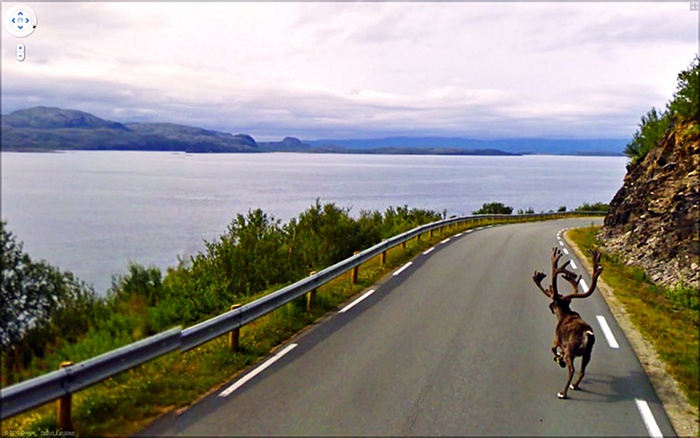Wednesday 11th November 2015Artist Spotlight: Jon Rafman
Virtual worlds are everywhere these days. Well, technically speaking, they're nowhere in real space as they're virtual, but the impact they have on our real lives is anything but virtual. From Street View to Second Life to Facebook, virtual worlds shape our social interactions and real world decision-making on a daily basis. While they masquerade as games or tools, the impact they have on our perceptions of both the world and ourselves are at the same time both staggering and yet often opaque to us in daily life. That is the juxtaposition that Canadian-born artist Jon Rafman explores in his work, which has hung in some of the most prestigious galleries, including London's Saatchi Gallery.
The exhibit he is probably best known for is an unexpectedly engaging yet slightly controversial one, entitled 'The Nine Eyes of Google Street View', which also happens to be the one that was featured at the Saatchi Gallery. An exploration of the world through the eyes of Google Street View, it was a remarkable exhibit that pushed some of the boundaries of our own perceptions of art by using "found photography". For those of you who are unaware, Google Street View is a feature of their popular Maps software that allows users to traverse a virtual version of the world. This was made possible thanks to an astonishingly ambitious mapping project, wherein a number of cars with 9 cameras mounted on their roofs traversed every single street in most major cities in the West (this also provided the name for the exhibition).
"The work is connected to the history of street photography but also to the 20th-century ready-made movement. So leaving those artefacts in the image is extremely important. In the bottom-left corner of each picture is a link that says, 'Report a problem'. Maybe in the middle ages you passed somebody in trouble on the road and were confronted with the moral dilemma of whether to help them. Then came a time when you could call the police. Now we've reached the point where it's a hyperlink. That represents just how alienated we've become from reality," Rafman explains.
Fortunately for Rafman in this all too litigious world, Google has a standing policy of not legally pursuing anyone who uses their photographs for artistic purposes. To see more of his work, visit his website at http://jonrafman.com/ .
Posted on November 11th 2015 on 08:17pm
0 Comments
 Virtual worlds are everywhere these days. Well, technically speaking, they're nowhere in real space as they're virtual, but the impact they have on our real lives is anything but virtual. From Street View to Second Life to Facebook, virtual worlds shape our social interactions and real world decision-making on a daily basis. While they masquerade as games or tools, the impact they have on our perceptions of both the world and ourselves are at the same time both staggering and yet often opaque to us in daily life. That is the juxtaposition that Canadian-born artist Jon Rafman explores in his work, which has hung in some of the most prestigious galleries, including London's Saatchi Gallery.
Virtual worlds are everywhere these days. Well, technically speaking, they're nowhere in real space as they're virtual, but the impact they have on our real lives is anything but virtual. From Street View to Second Life to Facebook, virtual worlds shape our social interactions and real world decision-making on a daily basis. While they masquerade as games or tools, the impact they have on our perceptions of both the world and ourselves are at the same time both staggering and yet often opaque to us in daily life. That is the juxtaposition that Canadian-born artist Jon Rafman explores in his work, which has hung in some of the most prestigious galleries, including London's Saatchi Gallery.



